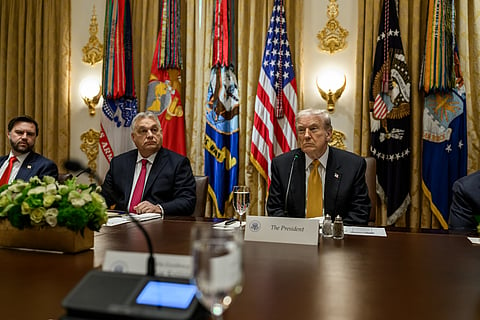

Hungarian Prime Minister Viktor Orbán met with U.S. President Donald Trump at the White House on Friday, in an effort to revive the recently cancelled summit between Trump and Russian President Vladimir Putin that was to be held in Budapest.
Orbán, a long-time ally of Trump and a vocal critic of EU sanctions on Russia, framed his visit as an attempt to “salvage” the proposed meeting by using Hungary’s diplomatic leverage and his own established rapport with the Kremlin. “We were talking about that with Viktor; he understands Putin and knows him very well,” Trump said during remarks following the meeting, adding that “there’s always a chance” the Budapest summit could still happen.
Trump had initially proposed the second summit with Putin following an October 16th phone call between the two leaders, suggesting Budapest as a neutral venue. However, within days, after a conversation between Secretary of State Marco Rubio and Russian Foreign Minister Sergey Lavrov, Trump reversed his decision, canceling the meeting and announcing new sanctions on two of Russia’s largest oil firms, Rosneft and Lukoil.
Orbán managed to secure a limited exemption from the sanctions for Hungary, which remains heavily dependent on Russian crude oil. The move is seen in Budapest as a significant diplomatic win for the Hungarian leader, who had been politically damaged by the sudden cancellation of the summit.
The Budapest meeting was viewed as a potential platform for restarting peace negotiations between Russia and Ukraine, but Trump’s reversal reportedly came after pressure from European allies, U.S. hardliners, and Ukrainian President Volodymyr Zelensky, who argued that Kiev still held the battlefield advantage in Donbas.
Russian officials have reacted angrily to the cancellation. Foreign Minister Lavrov said that it was Trump’s envoy, Steven Witkoff, who initially proposed a peace framework under which Ukraine would relinquish Donbas in exchange for a ceasefire. Putin reportedly agreed to attend the Alaska summit in August on that basis, but Trump refused to commit at the summit and instead reverted back to his original demand of unconditional ceasefire a month later following pressure from the same hardliners and Zelensky on the basis that Ukraine was winning the war.
The reversal has left Moscow deeply distrustful of Washington’s intentions, with some Russian analysts suggesting that Putin, already under political pressure at home for pursuing talks with Trump, may now be unable to justify continued dialogue with the United States.